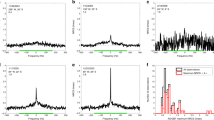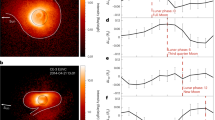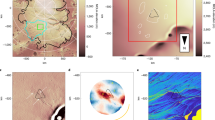Abstract
I SUGGEST that the thermal anomalies found recently in infra-red lunar observations1,2 could be due to lunar roughness on a centimetre scale rather than due to changes in the thermal composition of lunar rock or localized thermal sources. The idea of roughness of centimetre dimensions3 has now been directly verified by radar reflexion measurements. In fact, some protagonists of the dust hypothesis now incorporate this type of roughness in their models of the lunar crust.
This is a preview of subscription content, access via your institution
Access options
Subscribe to this journal
Receive 51 print issues and online access
$199.00 per year
only $3.90 per issue
Buy this article
- Purchase on Springer Link
- Instant access to full article PDF
Prices may be subject to local taxes which are calculated during checkout
Similar content being viewed by others
References
Shorthill, R. W., and Saari, J. M., Boeing Res. Lab. Rep., D1–82–0404 (1965).
Murray, B. C., Rep. Roy. Soc. Disc., London (June, 1965).
Gear, A. E., and Bastin, J. A., Nature, 196, 1305 (1962).
Shorthill, R. W., Boeing Res. Lab. Rep., D1–82–0196 (1962).
Pettingill, G. H., and Henry, J. C., J. Geophys. Res., 67, 4881 (1962).
Author information
Authors and Affiliations
Rights and permissions
About this article
Cite this article
BASTIN, J. Lunar Hot Spots. Nature 207, 1381–1382 (1965). https://doi.org/10.1038/2071381b0
Published:
Issue Date:
DOI: https://doi.org/10.1038/2071381b0
This article is cited by
-
Infrared observations of the moon and their interpretation
The Moon (1972)
-
Infrared studies of the lunar terrain
The Moon (1971)
-
Thermal radiation from the moon and the physical properties of the upper lunar layer
Radiophysics and Quantum Electronics (1970)
Comments
By submitting a comment you agree to abide by our Terms and Community Guidelines. If you find something abusive or that does not comply with our terms or guidelines please flag it as inappropriate.



